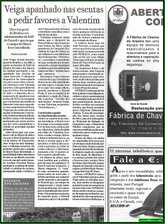Benfica officials mapped out a five-year plan to “dominate the external environment” and increase the club’s power over Portugal’s politicians, journalists, and justice system. ouviste ANA PERES?
In Portugal, too, interest in Football Leaks had fallen away. After the initial stories about Sporting Lisbon and F.C. Porto, the platform had focussed mainly on the sport’s larger leagues. But, on a Tuesday afternoon that April, Francisco Marques, the communications director for F.C. Porto, was leaving a restaurant near Porto’s stadium when he received a message from an encrypted e-mail platform called Tutanota. It appeared to include an internal media-briefing document belonging to Benfica, F.C. Porto’s archrival. Marques asked the sender how he could be sure that it was real. “I think the attached images will suffice,” the source wrote, including screenshots of three Benfica officials’ in-boxes. One image had been taken in the previous half hour. A few days later, Marques received about twenty gigabytes of internal Benfica e-mails.
The rivalry between Benfica and F.C. Porto contains multitudes. It is the south against the north; the capital against the rest; cosmopolitan glamour against honest toil. Between them, the clubs have won the Portuguese league sixty-five times. In a country of ten million people, Benfica claims to have six million supporters, an assertion that gives rise to the idea that it is the most powerful institution in the country. Supporters of other clubs refer to Benfica as the Octopus and to the supposed shadowy nature of its influence in Portuguese society as Benfiquistão, or Benficastan. When I asked Marques whether he considered returning the e-mails, he laughed. “No,” he said. “This is a war.”
Marques has a show on Porto’s TV channel, and in the weeks that followed he began to read the Benfica e-mails aloud on the air. He excluded personal gossip and salacious material, and focussed on evidence of Benfica’s attempts to control the Portuguese game. In one instance, he shared secret briefings distributed to pro-Benfica commentators on Portuguese TV. In another, he read an e-mail correspondence referring to the “priests”—a group of eight referees who could be relied on to favor Benfica at decisive moments—which ended, “Now delete everything.” There was a PowerPoint presentation, from June, 2012, in which Benfica officials mapped out a five-year plan to “dominate the external environment” and increase the club’s power over Portugal’s politicians, journalists, and justice system. “Now it is public,” Marques said. “It is not fair. The competition is not fair.”
In early June, Marques handed the Benfica e-mails to the police. He had wondered whether they were connected to Football Leaks in some way. The source described himself as a Porto fan but a critic of the club’s president. On the afternoon of July 12th, Marques received a Tutanota e-mail with four attachments, concerning a deal that Benfica had struck on land taxes around its stadium, in Lisbon. Marques never heard from the source again.
On October 19th, the police raided Benfica’s Estádio da Luz, in northern Lisbon. Six weeks later, the leaks started again. This time, the source simply posted the club’s e-mails, unedited, on a blog titled O Mercado do Benfica, or the Benfica Market. “There were many dirty things,” Marques told me. The e-mails contained medical records and conversations between club officials and their wives, along with player contracts, tactical reports, and the club’s internal finances. A senior Benfica official compared the leaks to being under a terrorist attack. “We don’t know when it comes, the next one, where it comes from, or what sort of missile it is,” he said. “We don’t know anything.” The police raided the club’s offices twice in the early months of 2018. That March, the head of Benfica’s legal department, Paulo Gonçalves, was arrested on suspicion of bribing three judicial officials to provide him with updates on the case.
The Benfica scandal, the biggest in Portuguese soccer in recent decades, has driven the enmity between the clubs to new heights. Benfica is currently suing F.C. Porto, seeking seventeen million euros in damages. When Marques dropped me off at my hotel in Porto, he showed me his phone, which each day is deluged with messages from Benfica fans, promising to kill him. “It changed my life,” he said, not entirely unhappily. “Now I can’t go to the south.”

































.jpg)







































.jpg)









0 comentários:
Enviar um comentário